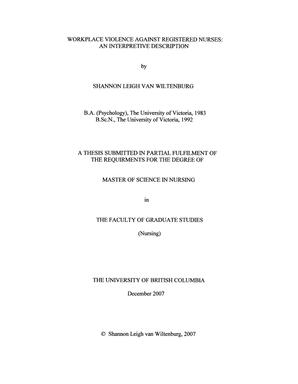Hewat, Roberta
Person Preferred Name
Roberta Hewat
Related Works
Content type
Digital Document
Abstract
Health personnel, especially nurses, are often victims of workplace violence. Unfortunately, little is known about the nurses' experience of violence. A research study was initiated to further explore the nurses' accounts of workplace violence so as to make dimensions of the nurses' experience visible and more fully understood. Interpretive description was the research methodology adopted for this study. Using theoretical sampling, ten Registered Nurses from the lower mainland and Vancouver Island, British Columbia participated in semi structured, audiotaped interviews. In this research, the nurses' experience of workplace violence emerged as a highly complex entity, deeply embedded in relationships and context. How nurses perceive the contextual factors of the organization, their immediate work environment and their individual attributes were found to play a significant role in how they respond to the phenomenon. The findings of this study suggest that organizational culture is an important determinant in managing workplace violence and that policy and administrative personnel play a pivotal role in influencing the problem. Nursing culture also influences the nurses' expectations, assumptions and actions towards violence. Participants voiced that role conflict often challenged their ability to enact acquired professional ideals and that that they routinely undertake roles in dealing with violence that are not appropriate to their level of knowledge or skill. Within the nurses' immediate work environment, bullying as well as physical and verbal abuse was commonplace. Overcrowding, long waits for service, poor environmental design and inadequate staff to patient ratios were seen as factors that increased nurses' risk. Individual factors were associated with emotional and psychological harms that nurses endured. Workplace violence affected self-concept, self-esteem, self-efficacy and the nurses' sense of control. Moral distress, self-blame, feelings of failure, loss of motivation and leaving the nursing profession were significant findings. The results of this study demonstrate a need to re-think how we can address workplace violence in nursing. Research and intervention is needed to further explore organizational policy and governing structures, the culture and climate of practice environments, and the fundamental role nursing education programs have in preparing nurses to manage workplace violence.
Origin Information
Content type
Digital Document
Abstract
This descriptive study investigated mothers' perceptions of and responses to neonatal crying behavior for the purpose of providing more relevant and effective nursing care to mothers with young infants. With the guidance of an interactive framework, quantitative and qualitative data were collected at three different time periods in the first postpartum month from 19 primiparous women who delivered healthy full term infants. Findings indicated that on the third postpartum day neonatal crying behavior was not an anticipated caregiving concern for any of the mothers. By the fourth postpartum week, however, 9 of the 19 mothers rated crying as a concern and had recorded significantly more crying behavior than the 10 mothers for whom crying was of little or no concern. Data revealed that the infants whose crying was of less concern were more content, consistently consolable, gave clearer cues regarding distress and comfort and had more easily definable and more compatible behavioral patterns than the infants whose crying was a concern. Mothers with little or no concern about their infant's crying differed from those with concerns in that they expected more crying behavior, perceived crying more positively, and were more prompt in their response to signs of distress. There were also statistically significant differences in that mothers with little or no concerns about crying were less concerned about spoiling their infant and experienced neonatal crying as a less negative influence on their feelings of maternal confidence. As a total group, the mothers' interpretations and responses to neonatal crying behavior were empiric and reflective of little academic or experiential preparation for understanding and managing neonatal crying. Mothers' expectations and health professionals' responses support a societal belief that mothering is intuitive, instinctive and to be learned "on the job." Findings indicate that the perinatal nurse needs to anticipate neonatal crying as a caregiving concern of mothers with young infants and must know and utilize current theory associated with infant crying and maternal-infant interaction. The nurse must participate in the generation and subsequent promotion of innovative nursing interventions to decrease mothers' concerns about and increase their management of neonatal crying behavior.
Origin Information


